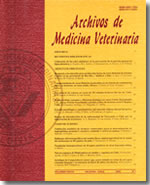Biology of embryonic stem cells (ES cells) in different species: potential applications in biomedicine
Main Article Content
Abstract
Embryonic stem cells (ES cells) are undifferentiated cells that derive from the inner cellular mass (ICM) of blastocyst-stage embryos. These cells can grow indefinitely in vitro preserving the ability to differentiate into all cell types of an individual. ES cells have become a powerful tool to study the early embryonic development, in functional genomic, to generate gene targeted transgenic animals and recently in animal cloning and medicine. Furthermore, current research developed on their biological properties and possible applications in regenerative medicine, due to their enormous potential of repair, are opening great possibilities that will allow to design, in the near future, revolutionary therapies to diverse human diseases nowadays incurables. In this review the general aspects of the isolation, derivation, culture, differentiation and transformation of these cells in different animal species are described as well as their promising applications in biomedicine.

